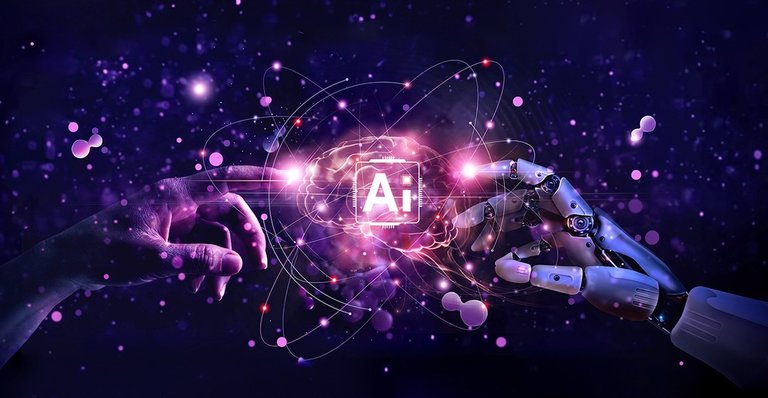5 Thesen, wie KI unsere Welt schon 2025 verändern wird
5 theses on how AI will change our world already in 2025
deutsch:
Marco Argenti, Chief Information Officer von Goldman Sachs, stellt 5 Thesen auf, wie und wo KI schon 2025 die Welt verändern wird.
Zitate aus folgendem Artikel:
Hybride Arbeitskräfte, Robotik, Expertenmodelle – was von KI im Jahr 2025 zu erwarten ist
Die neue hybride Belegschaft: KI-Systeme werden den Menschen immer ähnlicher. Warum sollte man sie nicht auch wie Menschen beschäftigen?
Wie Menschen beschäftigen? Heißt das geregelte Arbeitszeit, Urlaubsanspruch, Bruttolohn und Anteil an den Steuern und Sozialabgaben?
Sitzt dir dann demnächst ein Roboter gegenüber am Schreibtisch im Büro? Und ihr diskutiert dann über die Arbeit, Sport, Politik, Freizeit und Familie?
Das Aufkommen von KI-Experten: Die KI-Version der Doktortitel wird kommen.
Gehen wir bald nicht mehr zum Facharzt sondern zum Fachroboter? Erledigt der Dr. Roboter dann auch deine Steuererklärung? Und vertritt er dich als dein Anwalt vor Gericht?
Durchbrüche in der Robotik dank KI: Bisher wurden KI-Modelle im Wesentlichen durch das Lesen aller verfügbaren Bücher der Welt trainiert. Was wäre, wenn sie an der Welt selbst trainiert würden?
Bekommt dann jeder seinen ungelernten Roboter, dem er erst alles selber beibringen muß? Oder gibt es dann sowas wie eine Roboterschule?
Die Regulation verläuft von global zu lokal: Da die Welt regulatorische Klarheit erwartet, werden Prinzipien verantwortungsvoller künstlicher Intelligenz für Vorstände und ihre Vorsitzenden in den Mittelpunkt der Aufmerksamkeit rücken.
Wer stellt die Spielregeln auf? Der Staat, die Firmen, die Gesellschaft?
Konsolidierung großer Modelle: Die Erfahrungen der Formel 1 werden auf die KI übertragen.
Dieser Punkt erscheint mir am logischsten. Es gibt zwar 10 Teams in der Formel 1 aber nur etwa 3 Motorenlieferanten. Die Basissoftware für KI-Systeme können wahrscheinlich nur eine Handvoll Firmen wirklich entwickeln. Darauf setzen dann die Anwender auf und entwickeln ihre Tools und Andwendungen. Vergleichbar mit Mircrosoft, Apple, Google die das Betriebssystem für PC und Smartphone liefern.
Was passiert, wenn der Kollege Roboter sagt: Wir müssen das so und so machen!
Meine KI mir aber sagt: Das wird so nie und nimmer funktionieren!
Ich weiß, das sind provokante Fragen von mir. Aber KI wirft jede Menge an Fragen auf die wir möglichst schnell beantworten müssen. Ohne klare Regeln wird es ein ziemliches Chaos und Hauen und Stechen geben. Und da werden nicht nur gewisse Konzerne mitmischen sondern eben auch die großen Nationen wie USA, China, Europa, Russland, ... für die KI eine große strategische Bedeutung haben wird und auch jetzt schon hat.

english:
Marco Argenti, Chief Information Officer at Goldman Sachs, puts forward 5 theses on how and where AI will change the world as early as 2025.
Quotes from the following article:
[Hybrid workforce, robotics, expert models – what to expect from AI in 2025] -expect-is-16104318)
The new hybrid workforce: AI systems are becoming more and more similar to humans. Why shouldn't we employ them like humans?
Employ like human people? Does this mean regulated working hours, vacation entitlement, gross wages and share of taxes and social security contributions?
Will there soon be a robot sitting across from you at your desk in the office? And then you discuss work, sport, politics, leisure and family?
The emergence of AI experts: The AI version of PhDs is coming.
Will we soon no longer go to a specialist but to a specialist robot? Done by the Dr. Robot then also your tax return? And does he represent you in court as your lawyer?
Breakthroughs in robotics thanks to AI: Until now, AI models have essentially been trained by reading all the books available in the world. What if they were trained on the world itself?
Will everyone then get their untrained robot that they have to teach everything themselves? Or is there something like a robot school?
Regulation moves from global to local: As the world expects regulatory clarity, principles of responsible artificial intelligence will become the focus of attention for boards and their chairs.
Who sets the rules of the game? The state, the companies, society?
Consolidation of large models: The experiences of Formula 1 are transferred to AI.
This point seems the most logical to me. There are 10 teams in Formula 1 but only around 3 engine suppliers. Only a handful of companies can probably actually develop the basic software for AI systems. The users then build on this and develop their tools and applications. Comparable to Microsoft, Apple, Google, which provide the operating system for PCs and smartphones.
What happens when the robot colleague says: We have to do it this way and that way!
But my AI tells me: It will never, ever work like that!
I know these are provocative questions from me. But AI raises a lot of questions that we need to answer as quickly as possible. Without clear rules there will be a lot of chaos and punching and stabbing. And not only certain corporations will get involved, but also the large nations such as the USA, China, Europe, Russia, ... for which AI will and already has great strategic importance.

Geld verdienen mit Blogging, Fotos? - Make money with blogging, photograpy?
Lust auf 15% APR? Want 15% APR? Hier klicken und anmelden - Click here and register

Translation with Google, Deepl // Not financial advice, just my humble opinion
News / Snaps - Crypto - Corfu
Following ocd's curation trail - my Wikifolio's

No Formula 1 team can stay at the top without continuous development, and this also applies to artificial intelligence.
But the most important similarity for me is that no matter how advanced it is, it still needs an advanced human mind to manage the process.
@blkchn, I paid out 0.066 HIVE and 0.020 HBD to reward 1 comments in this discussion thread.